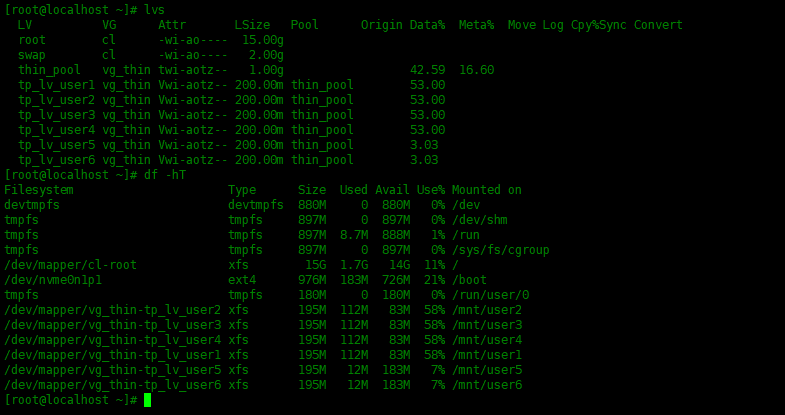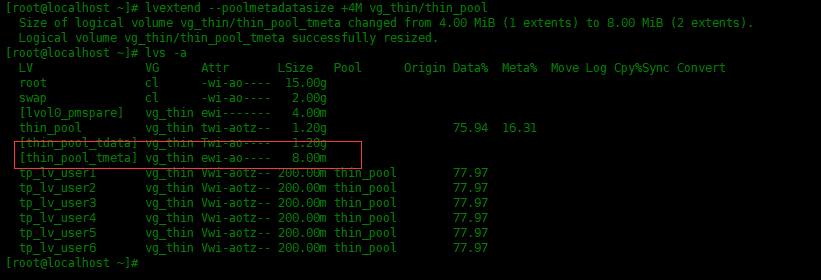Centos8中创建LVM精简逻辑卷
作者:互联网
创建LV时,将分配标准逻辑卷中的块,但是在精简配置的逻辑卷中,将在写入时分配它们。因此,精简配置的LV具有虚拟大小,并且可能比物理可用存储大得多。以后可以根据需要增加为精简配置的LV提供的物理存储量。标准LV中的块是在VG中分配的(在创建过程中),而精简LV中的块是从特殊的“瘦池LV”分配的(使用过程中)的。精简池LV包含物理存储块,而精简LV中的块只是精简池LV中的参考块。 必须先创建精简池LV,然后才能在其中创建精简LV。精简池LV是通过组合两个标准LV来创建的:一个大数据LV,它将保存精简LV的块;一个元数据LV,它将保存元数据。元数据跟踪哪些数据块属于每个精简LV。 精简LV的快照非常有效,因为共享了精简LV通用的数据块及其快照。快照可以是精简LV或其他精简快照。递归快照共有的块也在瘦池中共享。快照序列没有限制或降级。写入精简LV或快照LV时,它们会消耗精简池中的数据块。随着池中可用数据块的减少,可能需要提供更多可用块。这是通过使用VG的额外物理空间扩展精简池数据LV来完成的。从精简池中删除精简LV或快照也可以释放精简池中的块。但是,删除LV并不总是一种释放精简池中空间的有效方法,因为该数量仅限于不与池中其他LV共享的块数。精简池的增量块分配可能导致精简LV变得碎片化。标准LV通常通过在创建过程中一次分配所有块来避免此问题
系统环境 创建精简池下面我们添加一块硬盘。创建物理卷,然后创建卷组:
[root@localhost ~]# pvcreate /dev/sda Physical volume "/dev/sda" successfully created. [root@localhost ~]# vgcreate vg_thin /dev/sda Volume group "vg_thin" successfully created [root@localhost ~]# vgs VG #PV #LV #SN Attr VSize VFree cl 1 2 0 wz--n- <19.00g <2.00g vg_thin 1 0 0 wz--n- <20.00g <20.00g

上面已经创建好一个新的卷组了,名字为vg_thin。然后在现有卷组的中创建一个精简池:
[root@localhost ~]# lvcreate -L 1G -T vg_thin/thin_pool Thin pool volume with chunk size 64.00 KiB can address at most 15.81 TiB of data. Logical volume "thin_pool" created. [root@localhost ~]# lvs LV VG Attr LSize Pool Origin Data% Meta% Move Log Cpy%Sync Convert root cl -wi-ao---- 15.00g swap cl -wi-ao---- 2.00g thin_pool vg_thin twi-a-tz-- 1.00g 0.00 10.94

创建精简池之后,我们就可以从精简池中创建精简卷。在本实验中创建四个精简卷,每个精简卷的大小为200 MB。
[root@localhost ~]# lvcreate -V 200M -T vg_thin/thin_pool -n tp_lv_user1 Logical volume "tp_lv_user1" created. [root@localhost ~]# lvcreate -V 200M -T vg_thin/thin_pool -n tp_lv_user2 Logical volume "tp_lv_user2" created. [root@localhost ~]# lvcreate -V 200M -T vg_thin/thin_pool -n tp_lv_user3 Logical volume "tp_lv_user3" created. [root@localhost ~]# lvcreate -V 200M -T vg_thin/thin_pool -n tp_lv_user4 Logical volume "tp_lv_user4" created.

将上面创建的四个精简卷格式化为xfs格式:
[root@localhost ~]# mkfs.xfs /dev/vg_thin/tp_lv_user1 [root@localhost ~]# mkfs.xfs /dev/vg_thin/tp_lv_user2 [root@localhost ~]# mkfs.xfs /dev/vg_thin/tp_lv_user3 [root@localhost ~]# mkfs.xfs /dev/vg_thin/tp_lv_user4
创建挂载点,并挂载:
[root@localhost ~]# mkdir -p /mnt/user{1..4}
[root@localhost ~]# mount /dev/vg_thin/tp_lv_user1 /mnt/user1
[root@localhost ~]# mount /dev/vg_thin/tp_lv_user2 /mnt/user2
[root@localhost ~]# mount /dev/vg_thin/tp_lv_user3 /mnt/user3
[root@localhost ~]# mount /dev/vg_thin/tp_lv_user4 /mnt/user4

向这四个目录写入一些文件:
[root@localhost ~]# dd if=/dev/zero of=/mnt/user1/test.img bs=1M count=100 [root@localhost ~]# dd if=/dev/zero of=/mnt/user2/test.img bs=1M count=100 [root@localhost ~]# dd if=/dev/zero of=/mnt/user3/test.img bs=1M count=100 [root@localhost ~]# dd if=/dev/zero of=/mnt/user4/test.img bs=1M count=100
然后运行下面命令查看以下使用空间:
[root@localhost ~]# lvs

我们可以注意到精简池利用率为41.41%
再创建两个200 MB的精简卷。可以发现创建这两个精简卷会超过所设置的精简池的大小,虽然可以创建成功,但这样做会有更大的风险,并提示一些超额的警告。
[root@localhost ~]# lvcreate -V 200M -T vg_thin/thin_pool -n tp_lv_user5 Logical volume "tp_lv_user5" created. [root@localhost ~]# lvcreate -V 200M -T vg_thin/thin_pool -n tp_lv_user6 WARNING: Sum of all thin volume sizes (1.17 GiB) exceeds the size of thin pool vg_thin/thin_pool (1.00 GiB). WARNING: You have not turned on protection against thin pools running out of space. WARNING: Set activation/thin_pool_autoextend_threshold below 100 to trigger automatic extension of thin pools before they get full. Logical volume "tp_lv_user6" created.

下面我们删掉刚才创建的tp_lv_user5和tp_lv_user6,在lvm.conf配置文件中开启超额保护,并重新创建这两个精简卷:
[root@localhost ~]# lvremove -f /dev/vg_thin/tp_lv_user5 Logical volume "tp_lv_user5" successfully removed [root@localhost ~]# lvremove -f /dev/vg_thin/tp_lv_user6 Logical volume "tp_lv_user6" successfully removed
编辑/etc/lvm/lvm.conf配置文件,将下两个参数的值修改一下:
# 当精简池的使用率超过此百分比时,将自动扩展该池,将其更改为100将禁用自动扩展。可接受的最小值是50。
thin_pool_autoextend_threshold = 80
# 通过自动扩展精简池,会增加这个百分比的额外空间。添加到精简池的额外空间量是其当前大小的百分比。
thin_pool_autoextend_percent = 20
下面创建tp_lv_user5和tp_lv_user6两个精简卷:
[root@localhost ~]# lvcreate -V 200M -T vg_thin/thin_pool -n tp_lv_user5
Logical volume "tp_lv_user5" created.
[root@localhost ~]# lvcreate -V 200M -T vg_thin/thin_pool -n tp_lv_user6
Logical volume "tp_lv_user6" created.
[root@localhost ~]# mkfs.xfs /dev/vg_thin/tp_lv_user5
[root@localhost ~]# mkfs.xfs /dev/vg_thin/tp_lv_user6
[root@localhost ~]# mkdir -p /mnt/user{5..6}
[root@localhost ~]# mount /dev/vg_thin/tp_lv_user5 /mnt/user5
[root@localhost ~]# mount /dev/vg_thin/tp_lv_user6 /mnt/user6
看一下使用的情况:

下面我们向/mnt/user5和/mnt/user6填充内容,直到thin_pool精简池的使用率超过80%,我们可以看到精简池的容量扩容了。
[root@localhost ~]# lvs LV VG Attr LSize Pool Origin Data% Meta% Move Log Cpy%Sync Convert root cl -wi-ao---- 15.00g swap cl -wi-ao---- 2.00g thin_pool vg_thin twi-aotz-- 1.20g 75.94 22.66 tp_lv_user1 vg_thin Vwi-aotz-- 200.00m thin_pool 77.97 tp_lv_user2 vg_thin Vwi-aotz-- 200.00m thin_pool 77.97 tp_lv_user3 vg_thin Vwi-aotz-- 200.00m thin_pool 77.97 tp_lv_user4 vg_thin Vwi-aotz-- 200.00m thin_pool 77.97 tp_lv_user5 vg_thin Vwi-aotz-- 200.00m thin_pool 77.97 tp_lv_user6 vg_thin Vwi-aotz-- 200.00m thin_pool 77.97

可以看到上面,thin_pool精简池的容量提升了200M,这就说明当精简池的使用率超过80%时,提升20%的容量。
扩展精简池时,我们需要遵循两个步骤:
- 1. 扩展精简池的元数据
- 2. 然后再扩展精简池。
要扩展精简池,我们不应该立即继续扩展精简池。首先,通过运行lvs -a查看现有元数据使用的大小情况。
[root@localhost ~]# lvs -a LV VG Attr LSize Pool Origin Data% Meta% Move Log Cpy%Sync Convert root cl -wi-ao---- 15.00g swap cl -wi-ao---- 2.00g [lvol0_pmspare] vg_thin ewi------- 4.00m thin_pool vg_thin twi-aotz-- 1.20g 75.94 22.66 [thin_pool_tdata] vg_thin Twi-ao---- 1.20g [thin_pool_tmeta] vg_thin ewi-ao---- 4.00m tp_lv_user1 vg_thin Vwi-aotz-- 200.00m thin_pool 77.97 tp_lv_user2 vg_thin Vwi-aotz-- 200.00m thin_pool 77.97 tp_lv_user3 vg_thin Vwi-aotz-- 200.00m thin_pool 77.97 tp_lv_user4 vg_thin Vwi-aotz-- 200.00m thin_pool 77.97 tp_lv_user5 vg_thin Vwi-aotz-- 200.00m thin_pool 77.97 tp_lv_user6 vg_thin Vwi-aotz-- 200.00m thin_pool 77.97

元数据的当前大小仅为4 MB。让我们在当前大小的基础上添加4MB。
[root@localhost ~]# lvextend --poolmetadatasize +4M vg_thin/thin_pool

可以看到[thin_pool_tmeta]已经变成8M了。
完成扩展元数据后,开始将精简池扩展到所需的大小。将精简池扩容量再添加1G容量。
[root@localhost ~]# lvextend -L +1G /dev/vg_thin/thin_pool

现在大小已变成2.2G了。
扩展精简卷和扩展精简池类似:
[root@localhost ~]# lvextend -L +200M /dev/vg_thin/tp_lv_user1

要删除精简池,首先需要卸载所有文件系统,然后删除所有精简卷,最后删除精简池。
# 卸载分区
[root@localhost ~]# umount /mnt/user{1..6}
# 删除精简卷
[root@localhost ~]# lvremove -y /dev/vg_thin/tp_lv_user[1-6]
Logical volume "tp_lv_user1" successfully removed
Logical volume "tp_lv_user2" successfully removed
Logical volume "tp_lv_user3" successfully removed
Logical volume "tp_lv_user4" successfully removed
Logical volume "tp_lv_user5" successfully removed
Logical volume "tp_lv_user6" successfully removed
# 删除精简池
[root@localhost ~]# lvremove -y /dev/vg_thin/thin_pool
Logical volume "thin_pool" successfully removed
使用lvs 命令查看以下,是否已经删除干净:
[root@localhost ~]# lvs -a LV VG Attr LSize Pool Origin Data% Meta% Move Log Cpy%Sync Convert root cl -wi-ao---- 15.00g swap cl -wi-ao---- 2.00g

精简卷是可以创建大于可用磁盘的逻辑卷。使用精简卷,你可以管理可用空间的存储池(称为精简池),可以在应用程序需要时将其分配给任意数量的设备。精简池可以在需要时进行动态扩展,以节省成本。
标签:vg,tp,lv,精简,thin,LVM,root,Centos8 来源: https://www.cnblogs.com/wangchengyi/p/15693175.html